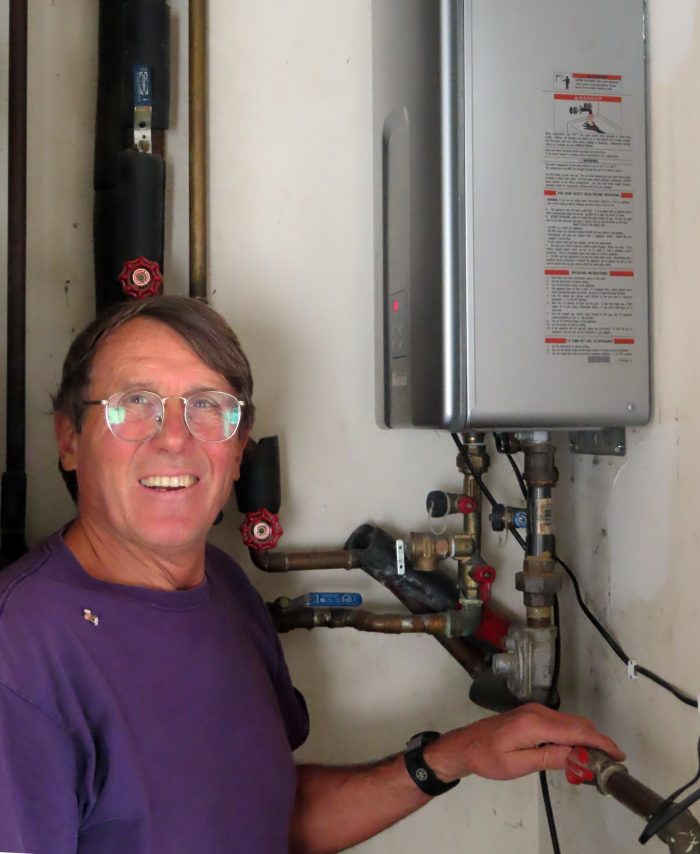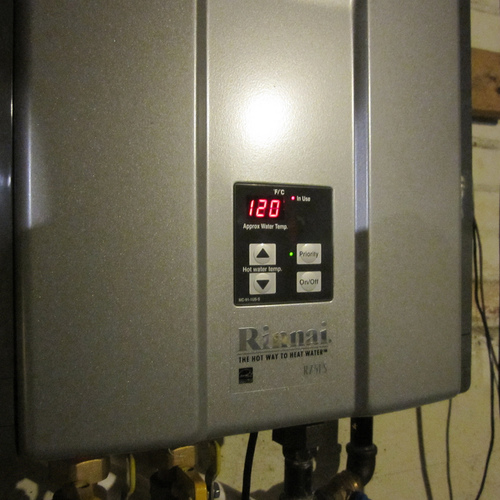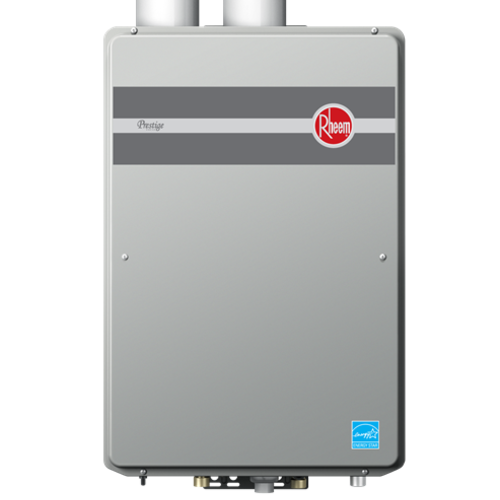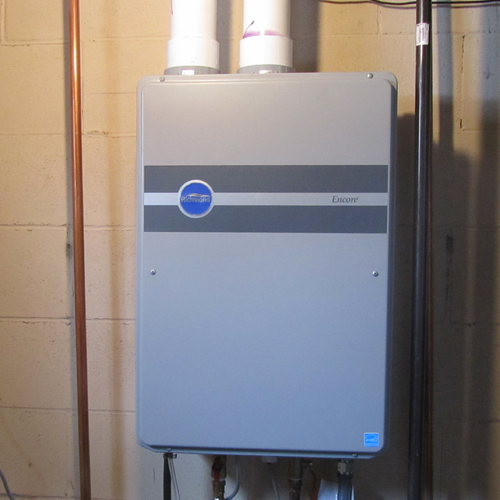
My house has a tankless gas-fired water heater. I’ve owned several brands over the years, including an Aquastar and a Bosch, but my current model is one made by Rinnai.
The standard advice for owners of a tankless gas water heater is to clean out the mineral deposits that build up in the water heater pipes—a process called descaling—once a year. I suspect that annual descaling isn’t necessary, except perhaps in regions of the country that have very hard water. I have owned my Rinnai heater for seven years, and I’ve never performed any descaling.
Frankly, the descaling process sounded intimidating, so I followed the common-sense dictum, “If it ain’t broken, don’t fix it.”
About two weeks ago, however, my wife and I noticed that the rate of flow through the water heater had significantly diminished. We were still getting hot water out of the tap, but it wasn’t flowing very quickly. I knew what I had to do: it was time for descaling.
You may be wondering…
If you own a gas-fired tankless water heater, you may have several descaling questions.
Do you need to perform descaling? If so, how often? Do you have to hire a plumber to perform the work, or is it possible to do it yourself? Assuming it’s possible, how complicated is it?
Don’t be intimidated
First, the good news: the process wasn’t as difficult as I anticipated. For me, the key was to buy a descaling kit. My kit cost $135; I purchased it at Amazon.com. That’s significantly less than most plumbers would charge to descale my water heater—and the kit can be used for years and years.
The kit I brought is sold under the Kelaro brand name, but other…
Weekly Newsletter
Get building science and energy efficiency advice, plus special offers, in your inbox.

This article is only available to GBA Prime Members
Sign up for a free trial and get instant access to this article as well as GBA’s complete library of premium articles and construction details.
Start Free TrialAlready a member? Log in














23 Comments
Thanks Martin! Though I don't have a tankless water heater several friends and family members do - and I'm sure they have no clue they should descale periodically. I'm going to bundle one of my small sump pumps a bucket and washing machine hoses together to loan along with a link to this article so they can execute the procedure. There are so many house maintenance chores that average homeowners aren't aware they need to do (or have done by a service pro) like changing HVAC filters, servicing water softener / filter systems and changing out the anode rod in a heat pump water heater.
HiYa Mike Guertin,
You are so right about maintenance chores that homeowners--often unwittingly--don't do. Jon Harrod wrote a great article about that and the comments are equally valuable: Home Maintenance Tasks You’re Probably Not Doing (and Should Be).
Mike,
Which brings us back to the idea championed several times over the years in FHB articles of each house having a manual.
I'm afraid manuals don't help unfortunately. We need a household dashboard display on the front of every refrigerator alerting owners that something is due for maintenance. A 'Check Engine' or "Maintenance Required" light perhaps.
I made manuals for each house I built or rebuilt. They didn't seem to help. The owners of the house I sold in November of 2022 contacted me this past Feburary with a few problems. Bathroom mirrors were fogging up a lot and not drying and the heating system wasn't able to get the house above 65F were the two main things. They hadn't followed the Maintenance Checklist with the monthly check of the ERV filters and filters at the indoor heat pump units. A lot of dust accumulated in 15 months.
I guess we can just keep trying.
Another complicating factor: Because maintenance advice is sometimes self-serving (have you ever had a car dealership's service department tell you that your vehicle needed ball joints or brake pads -- only to learn from another mechanic, one you trust, that your ball joints or brake pads are fine?) -- including, perhaps, the advice to remove scale from your tankless water heater every year -- some homeowners are somewhat skeptical of maintenance schedules published by contractors.
Mike,
Yeah, I suspect manuals act more as ways to cover yourself against claims by clients - and to Martins point may be (or be perceived to be) self-serving advice.
Given that, there may be implications as to what technologies we should include in houses. Spending time here on GBA it's easy to think of clients as interested in all this stuff, happy to constantly monitor sensors and controls, and actively maintaining equipment. That not generally being the case, choosing low-tech, low maintenance options may often be the best path.
The problem is that houses are built by builders, who are really in the business of selling houses rather than building them. And when you're selling a house the last thing you want to talk with the buyer about is maintenance, you want to be talking about barbecues and Thanksgiving dinners and all the fun and memories the house will bring. And the buyer doesn't want to hear about maintenance either.
I am a firm believer in water filtration and (where well wate is hard) softener. MY well produces water witha hardness of 193 mg/l (11 gpg). It also has iron and manganese. After the softener these are all close to zero. It would make sense to put i a softener or other filtration so that the water entering the tankless system is as close to pure as you can reasonably get.
Thanks for the guide. I did this to our exterior tankless after about 4 years of use with vinegar and concluded that it was unnecessary, I saw no change at all after recirculating for an hour. In my area the city reported water hardness ranges from 1.5-1.7 gpg or 29 mg/l. I'll do it again only if I notice any problem, but I expect the unit will die of something else before it's ever needed.
I read labels—carefully. Decades ago Lime Away was pretty good stuff and was largely composed of phosphoric acid (yeah, same stuff as in some soft drinks; sounds nasty but not terribly so). Nowadays it’s composed of a combination of organic acids and doesn’t work worth a damn. My plumbing supply sells descaling solution containing phosphoric acid and for a fairly steep price. One day, browsing my local restaurant supply store (The Restaurant Store) I discovered plastic bottles labeled for descaling ice machines and selling for relatively much less money.
Reading labels and SDSs can be a little tricky but is usually worthwhile. Producers are required to provide certain information about ingredients but they can often disguise the information in the form of CAS numbers (Chemical Abstract Services) which are very precise. It doesn’t provide concentration, though, and there are certain trade secrets that do not have to be divulged.
Wow, this post is really interesting. I have an old American Standard boiler with a coil that provides hot water. However, I have never descaled it. You can see, from the side, a mixing-type valve in the lower middle of the enclosed photo. The two faucets are at the upper right of the photo, with the reflection from a flashlight right on them.
Do you have any suggestions for me. I don't mind hiring a plumber to do this if this descaling applies to my system.
Thanks very much for the insight and advice.
Ruth,
If your hot water flow rate seems adequate, you probably don't have a problem. But your type of coil could benefit from descaling if you have any problems with flow rate.
All of that said, heating domestic hot water with a tankless coil in a boiler is a very inefficient way to heat domestic hot water -- especially during the summer. I urge you to buy a heat-pump water heater, and disable your tankless coil.
Thanks very much for replying so rapidly. It does seem as if hot water flow may be slightly decreasing on a scale of years (in other words, not suddenly).
My long term goal, and the reason I came across your post, is because I have a 49-year-old American Standard oil fuel-fired furnace. So I am trying to figure out what to convert to. The furnace is working fine but I know that I have to convert within the next few years. However, I am a novice and am trying to learn more. It is really quite complex and your website is very helpful.
Ruth,
Looking at your photo, it's looks like you have a boiler, not a furnace. (Boilers and furnaces are different.) It's clearly time for you to get a new appliance to heat your house, as well as a new appliance to make domestic hot water.
You probably don't want to buy a new boiler with a tankless coil.
Thank you Martin, you are right, I have a boiler. It is very old and I am trying to figure out what to replace it with.
Do you have any suggestions for directions I might go in? I am overwhelmed by the different options. My house has baseboard heating with hot water running through it. Is it naive to think that I might be able to get something that would replace the boiler and attach to the existing forced hot water heating?
Perhaps an air-to-water heat pump if I can find one that can give about 75,000 btu/hr?
https://www.daikin.com/products/ac/lineup/heat_pump
Thanks if you have any thoughts about this.
Ruth
Ruth,
The simplest approach would be to buy a new boiler that burns the same fuel you now use. (I'm guessing that your boiler is fired by oil or natural gas.) Then purchase a separate water heater -- either a gas-fired water heater (if your house has access to natural gas) or an electric water heater. If you choose an electric water heater, the best option would be a heat-pump water heater.
Depending on the size and configuration of your house, you might also consider abandoning your baseboard hot-water heating system, and instead install one or more ductless minisplit heat pumps (or perhaps a ducted heat pump) for space heating. This would be expensive, but it would make your house ready for our all-electric future.
Thanks very much for your clear answer. We are currently burning fuel oil. It is just not very environmentally friendly.
From reading other interesting posts on this blog, I question whether my 1/2-century-old electrical service (100 amp) can handle a heat pump.
If so, or if I replace the breaker box, would it be reasonable to install a ductless heat pump on the upper floor (house is a raised ranch). In other words, hope that the old boiler will keep working for a while longer, and that the mini-split might help in this regard. Perhaps the heat pump might also help in terms of the fact that we have no cooling system but environmental warming is very evident in New Hampshire.
Again, I am very appreciative of your knowledge and help.
Ruth
I just bought and will install an AO Smith tankless that claims no maintenance is required for the unit's life. I am unsure how it keeps itself descaled, but I am about to find out.
If "no maintenance is required for the unit's life," the meaning is clear: once the unit's tubing is clogged by scale, its life is over. The promise depends entirely on the definition of "the unit's life" -- and on what type of life span the customer is willing to accept.
It has a filter. I assume you change occasionally, but I have yet to get that far into the installation and maintenance. It comes with a 15-year scale warranty, which is longer than the lifetime warranty I have on my existing heater: https://www.hotwater.com/products/tankless-adapt-premium-condensing-adapt/athr-199x3-100/100374812.html
OK -- a 15-year warranty is useful, since my unit clogged in 7 years.
Replacing a filter is maintenance. If that doesn't count as maintenance, I'd like to know what does.
Log in or become a member to post a comment.
Sign up Log in